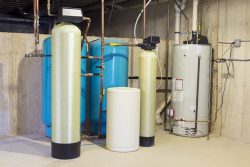What Should I Consider When Purchasing A Water Heater With My Well?
 If you rely on a well for your household water supply, you may be wondering what factors to consider when purchasing a water heater. Since well water can differ from municipal water sources, it’s essential to choose a water heater that can handle the specific characteristics of well water. In this blog post, we will discuss the key considerations to keep in mind when buying a water heater for your well.
If you rely on a well for your household water supply, you may be wondering what factors to consider when purchasing a water heater. Since well water can differ from municipal water sources, it’s essential to choose a water heater that can handle the specific characteristics of well water. In this blog post, we will discuss the key considerations to keep in mind when buying a water heater for your well.
1. Water quality testing
Before selecting a water heater, it’s crucial to understand the quality of your well water. Well water can vary significantly from one location to another, and factors such as pH levels, mineral content, and sediment can impact your water heater’s performance. Conduct a water quality test to determine the specific parameters of your well water. This information will allow you to choose a water heater that can effectively handle the specific characteristics of your well water.
2. Water heater capacity
Consider the size and capacity of the water heater you need for your household’s needs. Factors to consider include the number of bathrooms in your home, the number of people using hot water simultaneously, and any high-demand appliances like dishwashers or washing machines. Well water can sometimes be colder than water from municipal sources, so you may need a larger water heater to compensate for the lower starting temperature.
3. Energy efficiency
When purchasing a water heater, energy efficiency should be a top consideration. Heating water is typically one of the largest energy expenses in a household, so choosing an energy-efficient option can help you save on utility bills in the long run. Look for water heaters with a high Energy Factor (EF) rating, which indicates how efficiently the appliance converts energy into hot water. Tankless water heaters are generally more energy-efficient than traditional tank-style models.
4. Corrosion resistance
Well water often contains varying levels of minerals and sediments, which can increase the risk of corrosion in your water heater. To ensure longevity and reliable performance, consider a water heater that is specifically designed to resist corrosion. For example, some models have glass-lined tanks or utilize stainless steel components that can withstand the corrosive effects of well water. This feature will help prevent premature failure and costly repairs or replacements.
5. Maintenance requirements
Regular maintenance is essential for preserving the performance and lifespan of your water heater, regardless of the water source. However, if your well water has higher mineral content, you may need to perform additional maintenance tasks to keep your water heater in optimal condition. Look for models that offer easy access to the heating elements, anode rods, and other components that may require periodic cleaning or replacement. Regular maintenance will not only extend the life of your water heater but also ensure that your well water heats efficiently.
6. Warranty and customer support
When investing in a water heater, it’s crucial to consider the warranty and customer support offered by the manufacturer. Well water can pose unique challenges to water heaters, and a reliable warranty will provide you with peace of mind. Look for warranties that cover not only the tank but also critical components like heating elements and thermostats. Additionally, choose a manufacturer that has a reliable customer support system in place to assist you with any troubleshooting or technical queries.
Conclusion
Purchasing a water heater for a well requires careful consideration of factors such as water quality, capacity, energy efficiency, corrosion resistance, maintenance requirements, and warranty. By taking these aspects into account, you can select a water heater that will provide your household with reliable and efficient hot water for years to come. Remember, it’s always beneficial to consult with professional well-drilling contractors or plumbers who specialize in well water systems to ensure you make the best choice for your specific situation.
Got Questions? Let Us Help!
Categorised in: Well Water
